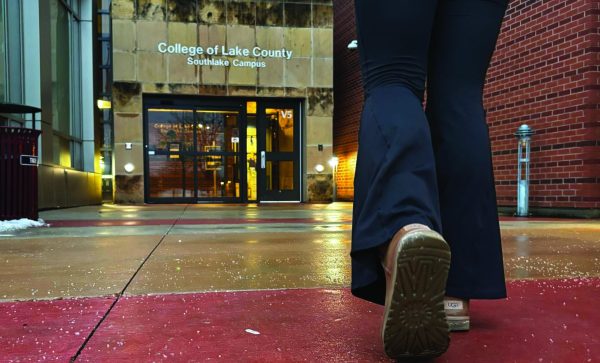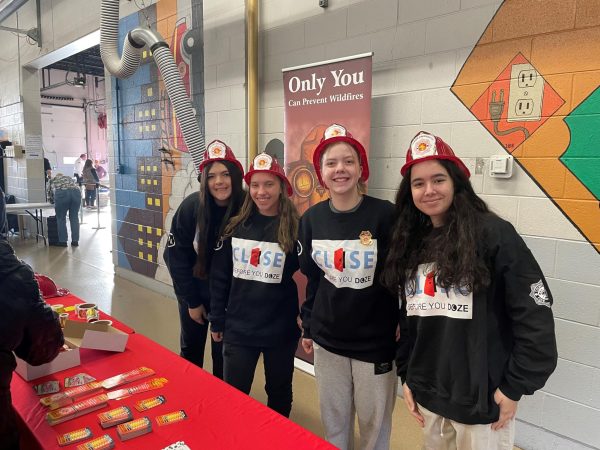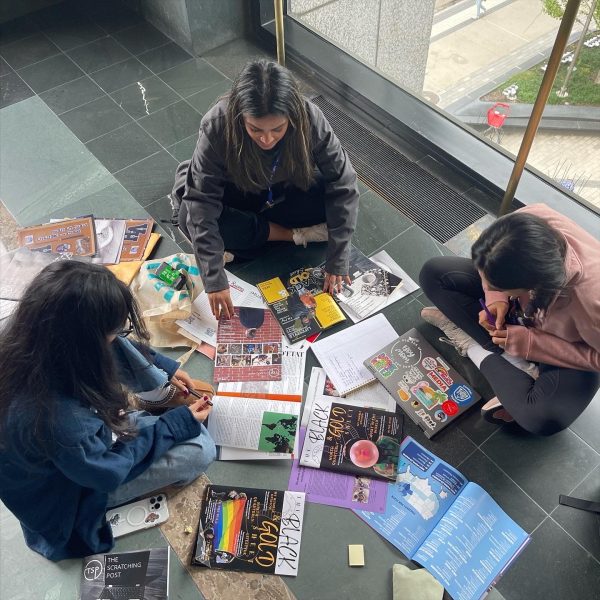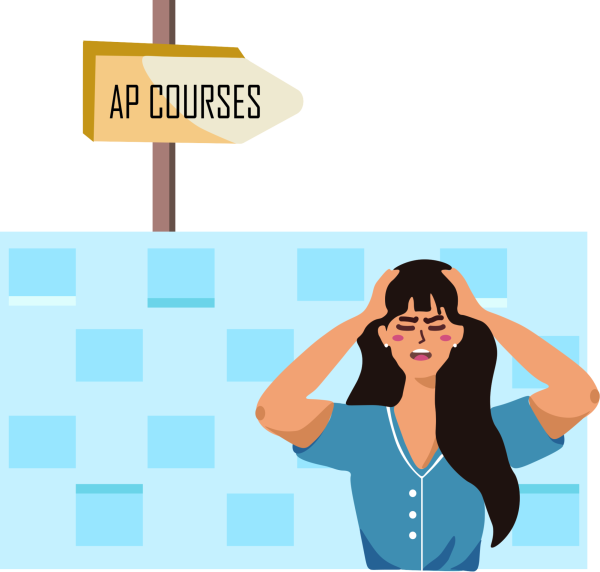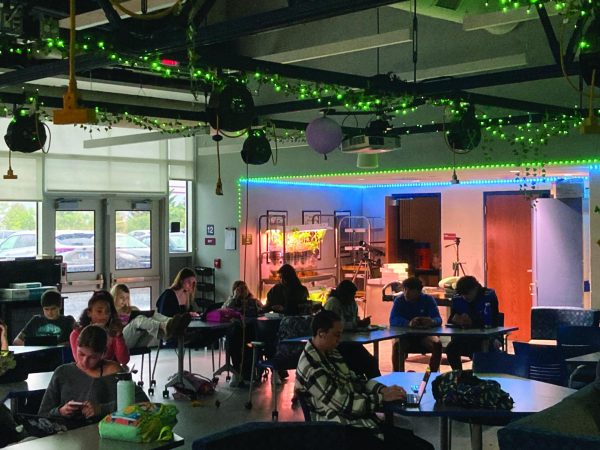Struggling with STEM

Created by Bob Dahm for Education Week.
As I looked over my answers for my physics final, I teared up in the realization that not only was I done with physics, but I was done with taking science classes in high school. After the fateful decision to take chem honors for second semester last year and struggling through physics, I have concluded that science is absolutely not for me.
I respect the study of science; I think it’s actually undervalued in much of the political climate, which is a problem.
At the same time, the liberal arts are becoming increasingly undervalued.
Results from a survey conducted by job seekers and HR professionals from a consulting firm, Millennial Branding and a career network, Beyond.com, found that “49% of job seekers said ‘no jobs’ exist for those with a liberal arts degree,” according to Laura Vanderkam, a writer for Fast Company.
While I’ve been toying with the idea of applying to liberal arts colleges, my heart isn’t set on it. Which I guess is good, because 49% of employers wouldn’t want me and my liberal arts degree?
Don’t worry, I won’t indulge everyone on my struggles of deciding between a public university, private university, or a liberal arts college. However, I have spent a great deal of my junior year feeling insecure about not succeeding in STEM.
By taking APUSH, AP Lang, and writing for the newspaper, I was able to engage in and study what I love: discussion, reading, writing, research, and history. Obviously, the workload of those classes took up a great deal of my time.
Meanwhile, I took precalc and physics, and I had to work hard to teach myself concepts that I can’t grasp as easily immediately. This, of course, was a responsibility of mine since I wanted to succeed in those classes.
My point? I was stretched out pretty thin. Meanwhile, I watched my peers succeed in all four of their academics at the AP level.
It’s totally a matter of jealousy on my part. I’m a huge advocate for using science to advance society, but unfortunately, it took Aakash about 40 minutes to make sure that I had the right hand rule down (physics reference to everyone fortunate enough to have not taken it).
So, not only am I jealous of some of my peers, but I am upset that it’ll be so much more difficult to become successful in the future given that I’m not going to major in STEM. We’ve all heard the three professions that’ll yield the highest salary: doctors, engineers, and lawyers.
So that, along with my father’s persistence, has led me to consider becoming a lawyer. I certainly like the idea of being a lawyer, but that’s the idea of it. How am I supposed to declare my major for college applications in the fall if I’m not taking law until second semester because that’s the only time that it’s offered?! (No, seriously, someone please tell me).
This really goes back to how much more limited “English and social studies” people are in their career choices if they want to have a higher salary (sorry to all of the “follow your passion” people; being financially secure is nice).
STEM careers, however, are much more varied. Careerwise Education’s list of careers available in Minnesota is quite long and has a great deal of variety.
Not only are there more options in STEM, but they’re obviously in high demand: “STEM jobs will increase 13% from now until 2022, a higher rate than all other careers,” predicts the Bureau of Labor Statistics, “STEM workers earn almost double the average of all other workers.”
Fortunately for me, I feel that I’ll be successful if I major in either pre-law, political science, or international relations.
But what about those who major in child and family studies, elementary education, social work, culinary arts, special education, recreation and leisure studies, religious studies, and athletic training, which are considered “the worst-paying college majors” according to Jenna Goudreau, a writer for Forbes?
It would be easy to tell the underpaid elementary education major that he or she should’ve chosen something else, but what if it’s his or her passion? And we need teachers, and intelligent ones at that.
It’s certainly difficult to value every occupation, especially when the demand for STEM majors is ever-increasing. No matter how I much I complain about my disposition in STEM, though, the situation will not change. Also, writing, reading, and studying history has always excited me. I actually cannot wait to continue to study that in the future.
What I do wish, however, is for a different attitude towards those who study STEM in comparison to the humanities and the liberal arts.
Through filling out a survey for me about a month ago, Emily Whalen (11) perfectly summarizes the conventional view of each type of person:
“To me, social studies and English people are more… passionate and driven about arts and interpersonal connections, while math and science people are more passionate about ideas and innovations,” says Whalen (11).
I, and probably most people, feel the same way. However, I think our view on both types of people, and ultimately, those studies, should change.
Zak Baumann (11), who considers himself scientifically and mathematically inclined, shared that like most STEM people, he prefers to reach a single true answer through logical explanations.
However, certain approaches to each type of study can be applied to the other.
“Wanting to find logical explanations… makes me more open-minded because I like to look at all the evidence in a situation before I draw my conclusion,” says Baumann (11).
Applying interpersonal connections, a “liberal arts” value, to the study of science demonstrates that methods can cross the disciplines
Consider peer review: not only do scientists have to re-construct their experiment multiple times to make sure it’s valid, but it needs to be accurately recreated by their peers. Thus, they must work together. In this way, interpersonal connections are crucial to scientific research.
Ernest Boyer used to be the president of the Carnegie Foundation for the Advancement of Teaching.
Boyer believes that approaches for each field of study can be applied to the other: “Traditional research designed to promote the advancement of knowledge should be complemented by the ‘scholarship of integration’ which makes connections across disciplines; the ‘scholarship of application,’ which concentrates on the interrelationship between theory and practice; and the “scholarship of teaching,” which both educates students and attracts them to the academic world,” says Boyer.
Just as elements of liberal arts, such as the love of scholarship, are important to STEM, using logic and reason to support a point is just as important to the liberal arts.
The relationship between the two is something that should be recognized more often. This would lead to greater respect of the other, I think. Possibly, more students will see themselves excel in both English/social studies and math/science.
In a utopia, those who excel in English and social studies would see a variety of successful occupations in high demand.
In a perfect world, I would be better at STEM.
In the real world, I hope that both types of study are equally respected without causing detriment to the other.



